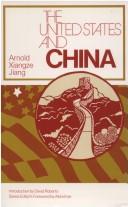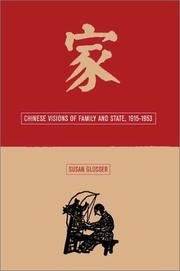| Listing 1 - 2 of 2 |
Sort by
|

ISBN: 1282069985 9786612069987 0226401944 9780226401942 9780226401874 0226401871 0226401898 9780226401898 6612069988 0226401871 9780226401898 Year: 1983 Publisher: Chicago University of Chicago Press
Abstract | Keywords | Export | Availability | Bookmark
 Loading...
Loading...Choose an application
- Reference Manager
- EndNote
- RefWorks (Direct export to RefWorks)
Kay Ann Johnson provides much-needed information about women and gender equality under Communist leadership. She contends that, although the Chinese Communist Party has always ostensibly favored women's rights and family reform, it has rarely pushed for such reforms. In reality, its policies often have reinforced the traditional role of women to further the Party's predominant economic and military aims. Johnson's primary focus is on reforms of marriage and family because traditional marriage, family, and kinship practices have had the greatest influence in defining and shaping women's place in Chinese society. Conversant with current theory in political science, anthropology, and Marxist and feminist analysis, Johnson writes with clarity and discernment free of dogma. Her discussions of family reform ultimately provide insights into the Chinese government's concern with decreasing the national birth rate, which has become a top priority. Johnson's predictions of a coming crisis in population control are borne out by the recent increase in female infanticide and the government abortion campaign.
Confucianism --- Families --- Socialism --- Women peasants --- Peasant women --- Peasants --- Rural women --- Religions --- History. --- China --- Rural conditions. --- S11/0701 --- S11/0705 --- S11/0720 --- S11/0730 --- #SML: Joseph Spae --- China: Social sciences--Clan and family in transition: general and before 1949 --- China: Social sciences--Clan and family: since 1949 --- China: Social sciences--Women's emancipation movement: general and before 1949 --- China: Social sciences--Women: since 1949 --- women, gender, family, household, china, peasant, revolution, social change, history, politics, asia, equality, communism, leadership, reform, womens rights, feminism, tradition, economics, marriage, kinship, population, birth rate, one child policy, marxism, anthropology, political science, abortion, government, female infanticide, confucianism, socialism, rural, village, nonfiction, land, labor, yenan, soviet, kiangsi.

ISBN: 1282758896 9786612758898 0520926390 1597345350 9780520926394 0585467811 9780585467818 9781282758896 0520227298 9780520227293 Year: 2003 Volume: 5 Publisher: Berkeley University of California Press
Abstract | Keywords | Export | Availability | Bookmark
 Loading...
Loading...Choose an application
- Reference Manager
- EndNote
- RefWorks (Direct export to RefWorks)
At the dawn of the twentieth century, China's sovereignty was fragile at best. In the face of international pressure and domestic upheaval, young urban radicals-desperate for reforms that would save their nation-clamored for change, championing Western-inspired family reform and promoting free marriage choice and economic and emotional independence. But what came to be known as the New Culture Movement had the unwitting effect of fostering totalitarianism. In this wide-reaching, engrossing book, Susan Glosser examines how the link between family order and national salvation affected state-building and explores its lasting consequences. Glosser effectively argues that the replacement of the authoritarian, patriarchal, extended family structure with an egalitarian, conjugal family was a way for the nation to preserve crucial elements of its traditional culture. Her comprehensive research shows that in the end, family reform paved the way for the Chinese Communist Party to establish a deeply intrusive state that undermined the legitimacy of individual rights.
Domestic relations --- Family policy --- Families --- Families and state --- State and families --- Public welfare --- Social security --- Social policy --- History. --- Government policy --- China --- History --- S02/0200 --- S11/0493 --- S11/0700 --- S11/0701 --- S11/0710 --- China: General works--Civilization and culture --- China: Social sciences--Society: 1911 - 1949 --- China: Social sciences--Clan and family: general and before 1949 (incl. names, clan rules) --- China: Social sciences--Clan and family in transition: general and before 1949 --- China: Social sciences--Women: general and before 1949 --- Familles --- Politique familiale --- Histoire --- Droit --- Chine --- 20th century. --- china. --- chinese culture. --- chinese history. --- civil rights. --- communist party. --- conjugal family. --- economic independence. --- egalitarian society. --- family order. --- family reform. --- government control. --- human rights. --- individual rights. --- marriage choice. --- modern china. --- national salvation. --- nationalism. --- new culture movement. --- patriarchy. --- reform. --- republican era. --- social change. --- sovereignty. --- state building. --- surveillance. --- totalitarianism. --- urban radicals.
| Listing 1 - 2 of 2 |
Sort by
|

 Search
Search Feedback
Feedback About UniCat
About UniCat  Help
Help News
News